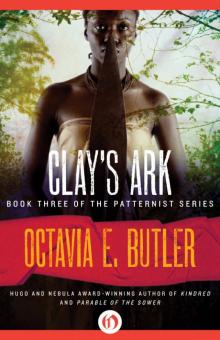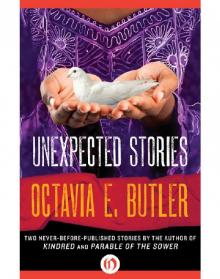- Home
- Octavia E. Butler
Clay's Ark Page 4
Clay's Ark Read online
Page 4
Meda was staring at Blake.
She must have been doing it for some time now. She had eaten her meal—a whole, roasted chicken plus generous helpings of everything else. Now she nibbled at a thick slice of ham and stared.
“What is it?” he asked her.
She looked at Eli. “Why wait?” she asked.
“God knows I almost didn’t,” he said. “Do what you want to.”
She got up, walked around the table, stood over Blake, staring down at him intently. Sweat ran down her thin, predatory face. “Come on, Doc,” she whispered.
Blake was afraid of her. It was ridiculous, but he was afraid.
“Get up,” she said. “Come on. Believe it or not, I don’t like to humiliate people.”
Sweat ran into her eyes, but she did not seem to notice. In a moment, she would take hold of him with her skinny claws. He stood up, stiff with fear of the woman and fear of showing it. He bumped the table, palmed a knife, secretly, he thought. The idea of threatening her with it, maybe using it on her, repelled him, but he gripped it tightly.
“Bring the knife if you want to,” she said. “I don’t care.” She turned and walked to the hall door. There she stood, waiting.
“Dad,” Keira said anxiously. “Please … do what they say.”
He looked at her, saw that she was frightened too.
She looked from him to Eli, but Eli would not meet her eyes. She faced Blake again. “Dad, don’t make them hurt you.”
What was it about these people? How were they able to terrify when they did nothing? It was as though there were something other than human about them. Or was it only their several guns?
“Dad,” Rane said, “do it. They’re crazy.”
He looked at Eli. If the girls were hurt in any way—any way at all—Eli would pay. Eli seemed to be in charge. He could permit harm or prevent it. If he did not prevent it, no circus trick would save him.
Eli stared back, and Blake felt that he understood. Eli had shown himself to be unusually perceptive. And now he looked almost as miserable as Blake felt.
Blake turned and followed Meda. He kept the knife. Everyone saw it now, and they let him keep it. That alone was almost enough to make him leave it. They managed to make him feel like a fool for wanting a weapon against armed people who had kidnapped him and his children at gunpoint. But he would have felt like a bigger fool if he had left the knife behind.
Meda led him into a back bedroom with blue walls, a solid, heavy door, and barred windows.
“My daughter is going to need her medication,” he said, wondering why he had not spoken of it to Eli.
“Eli will take care of her,” the woman said. Blake thought he heard bitterness in her voice, but her face was expressionless.
“He doesn’t know what she needs.”
“She knows, doesn’t she?” In the instant before he could lie, Meda nodded. “I thought she did. Give me the knife, Blake.” She said it quietly as she locked the door and turned to face him. She saw his refusal before he could voice it. “I didn’t want to tear into you in front of your kids,” she said. “Human nature being what it is, you probably wouldn’t be able to forgive me for that as quickly as you’ll forgive me for … other things. But in here, I’m not going to hold back. I don’t have the patience.”
“What are you talking about?”
She reached out so quickly that by the time he realized she had moved, she had him by the wrist in a grip just short of bone-cracking. As she forced the knife from his captive hand, he hit at her. He had never hit a woman with his fist before, but he had had enough from this one.
His fist met only air. Inhumanly fast, inhumanly strong, the woman dodged his blow. She caught his fist in her crushing grip.
He lurched against her to throw her off-balance. She fell, dragging him with her, cursing him as they hit the floor. The knife was still between them in one of his captive hands. He fought desperately to keep it, believing that at any moment the noise would draw one or both of the men into the room. What would they do to him for attacking her? He was committed. He had to keep the knife and, if necessary, threaten to use it on her. His daughters were not the only people who could be held as hostages.
The woman tried to get him off her. He had managed to fall on top and he weighed perhaps twice what she did. As strong as she was, she did not seem to know how to fight. She managed to take the knife and throw it off to one side so that it skittered under a chair. Angrily, he tried to punch her again. This time he connected. She went limp.
She was not unconscious; only stunned. She tried feebly to stop him when he went after the knife, but she no longer had the strength.
The knife was embedded in the wall behind the chair. Before he could pull it free, she was on him again. This time, she hit him. While he lay semiconscious, she retrieved the knife, opened a window, and threw it out between the bars. Then she staggered back to him, sat down on the floor next to him, hugging her knees, resting her forehead against them. She did not look as though she could see him. She was temptingly close, and as his vision cleared, he was tempted.
“You start that shit again, I’ll break your jaw!” she muttered. She stretched out on the rug beside him, rubbing her jaw. “If I break your bones, you won’t survive,” she said. “You’ll be like those damn bikers. We had to hurt them because there were too many of them for us to take it easy. All but two wound up with broken bones or other serious injuries. They died.”
“They died of their injuries … or of a disease?”
“It’s a disease,” she said.
“Have I been infected?”
She turned her head to look at him, smiled sadly. “Oh yes.”
“The food?”
“No. The food was just food. Me.”
“Contact?”
“No, inoculation.” She lifted his right arm, exposing the bloody scratches she had made. They hurt now that she had drawn his attention to them.
“You would have done that even if I hadn’t had the knife?” he asked.
“Yes.”
“All right, you’ve done it. Get away from me.”
“No, we’ll talk now. You’re our first doctor. We’ve wanted one for along time.”
Blake said nothing.
“It’s something like a virus,” she said. “Except that it can live and multiply on its own for a few hours if it has warmth and moisture.”
Then it wasn’t a virus, he thought. She didn’t know what she was talking about.
“It likes to attach itself to cells the way a virus does,” she continued. “It can multiply that way too. Don’t tune me out yet, Blake,” she said. “I’m no doctor, but I have information for you. Maybe you can use it to help yourself and your kids.”
That got his attention. He sat up, climbed painfully into the antique wooden rocking chair that he had shoved aside when he tried to reach the knife. “I’ll listen,” he said.
“It’s a virus-sized microbe,” she said. “Filtrable. I hear that means damned small.”
“Who told you?”
She looked surprised. “Eli. Who else?”
He could not quite bring himself to ask whether Eli was a doctor.
“He was a minister for a while,” she said as though he had asked. “A boy minister at the turn of the century when the country was full of ministers. Then he went to college and became a geologist. He married a doctor.”
Blake frowned at her. “What are you going to tell me now? That you’re telepathic?”
She shook her head. “I wish we were. We read body language. We see things you wouldn’t even notice—things we didn’t notice before. We don’t work at it; it isn’t a conscious thing. Among ourselves, it’s communication. With strangers, it’s protection.”
“Why haven’t you gotten treatment?”
“What treatment?”
“You haven’t tried to get any treatment, have you? What about Eli’s wife? Hasn’t she—”
“She’s dead. The diseas
e killed her.”
Blake stared at her. “Good God. And you’ve deliberately given it to me?”
“Yes,” she said. “I know it doesn’t make sense to you. It wouldn’t have to me before. But now … You’ll understand eventually. And when you do, I hope you’ll accept our way of living. It’s so damn hard when people don’t. Like having one of my kids go wrong.”
Blake tried to make sense of this. Before he could give up on her again, she got up and went over to him.
“It isn’t necessary for you to understand now,” she said. “For now, just listen and ask questions if you want to. Pretend you believe me.” She touched his face. Repelled, he caught her hand and pushed it away. His cheek hurt a little and he realized she had scratched him again. He touched his face and his hand came away bloody.
“What the hell are you going to do?” he demanded. “Keep scratching me as long as you can find a few inches of clear skin?”
“Not that bad,” she said softly. “I don’t understand why—maybe you will—but people with original infections at the neck or above get the disease faster. And infected people who get a lot of attention from us usually survive. The organism doesn’t use cells up the way a virus does. It combines with them, lives with them, divides with them, changes them just a little. Eli says it’s a symbiont, not a parasite.”
“But it kills,” Blake said.
“Sometimes.” She sounded defensive. “Sometimes people work hard to die. Those bikers, for instance … I took care of Orel—Ingraham, I mean. His first name’s Orel. He hates it. Anyway, I took care of him. He didn’t like me much then, but he let me. He survived okay. But the other biker who had a chance was a real bastard. Lupe stuck with him, but he kept trying to kill her—strangling, smothering, beating … When he tried to burn her to death in her sleep, she got mad and hit him too hard. Broke his neck.”
Blake put most of this aside for later consideration and focused on one implication. “Are you planning to sleep here?” he demanded.
She smiled. “Get used to the idea. After all, I can’t very well rape you, can I?”
He did not answer. He was thinking about his daughters.
She drew a deep breath, touched his hand without scratching this time. “I’m sorry,” she said. “I’m told I have the sensitivity of a hunk of granite sometimes. None of us are rapists here. No one is going to take your kids to bed against their wills.”
“So you say!”
“It’s true. Our men don’t rape. They don’t have to.”
“You haven’t had to do any of the things you’ve done.”
“But we have. Like I said, you’ll understand eventually. For now, you’ll just have to accept what I tell you. We’re changed, but we have ethics. We aren’t animals.”
Blake thought that was exactly what they were, but he kept quiet. There was no point in arguing with her. But Rane and Keira … What was happening to them?
Meda took a chair from the desk on the other side of the room and brought it over so that she could sit next to him. He watched her swing her thin body around. She moved like a man. She must have been a powerful-looking woman before her illness. Yet the illness had reduced her to wiry thinness. What would it do to Keira who had no weight to lose, who already had a disease that was slowly killing her?
Meda sat down and took his hands. “I wish you could believe me,” she said. “This is the worst time for you. I wish I could help more.”
“Help!” He snatched his hands away from her, disgusted. She was still perspiring heavily. In a cool room, she was soaking wet. And no doubt the perspiration was loaded with disease organisms. “You’ve ‘helped’ enough!”
She wiped her face and smiled grimly. “You still bring out the worst in me. You don’t feel or smell like one of us—like an infected person—yet.”
“Smell?”
“Oh yes. Part of your body language, part of your identity is your odor. And one of your earliest symptoms is going to be suddenly smelling things you never consciously noticed before. Eli found our place by following his nose. He was lost in the desert. We had water, and he smelled it.”
“He came here? This was your home, then?”
“… yes.”
He wondered about her sudden pensiveness, but took no time to question it. He had something more important to ask. “Where did Eli come from, Meda? Where did he catch the disease?”
She hesitated. “Look, I’ll tell you if you want me to. It’s my job to explain things to you. But there are some things you’ll have to understand before I tell you about Eli. First, like I said, I scratched your face just now so you’d get sick sooner. Most people take about three weeks to start feeling symptoms. Sometimes a little longer. You’ll feel yours a lot sooner—and you should be infectious in a few days.”
“That could mean I’ll die sooner,” Blake said.
“I’m not going to give you up that easily,” she said. “You’re going to make it!”
“Why did you rush things for me?”
“We’re afraid of you. We want you on our side because you might be able to help us save more converts—that’s what Eli calls them. We … we care about the people we lose. But we have to be sure of you, and we can’t until you’re one of us. Right now, you’re sort of in-between. You’re not one of us yet, but you’re … not normal either. If you escaped now and managed to reach other people, you’d eventually give them the disease. You’d spread it to everyone you could reach, and you wouldn’t be able to stay and help them. Nobody can fight the compulsion alone. We need each other.”
“Who did Eli have?” Blake asked. “His wife?”
“He had nobody. That was the problem. But before I get into that, I want to be sure you understand that there’s no way to leave here without starting an epidemic. The compulsion quiets down a little after you’ve been sick. You should have enough control then to go into town and buy whatever you’ll need that isn’t in that computerized bag Eli says you have.”
“Buy medical supplies?”
“Yes.”
“You’re going to trust me enough to let me go into town?”
“Yes, but nobody travels alone. There’s too much temptation to do harm. Blake, you aren’t ever going to be comfortable among ordinary people again.”
He didn’t know how he would have felt if he had believed her. But in fact, he meant to take any opportunity to escape that came his way. He did not intend to live his life as an emaciated carrier of a deadly disease. Yet he was afraid. Some of what Meda had said about the disease reminded him of another illness—one he had read about years before. He could not remember the name of it. It was something people did not get any longer—something old and deadly that people had once gotten from animals. And the animals had gone out of their way to spread it. The name came to him suddenly: rabies.
She watched him silently. “You don’t believe me, but you’re afraid,” she said. “That’s a start. There’s a lot to be afraid of.”
He stifled an impulse to deny his fear or explain it. “You were going to tell me about Eli,” he said.
She nodded. “Remember that ship a few years ago—the Clay’s Ark?”
“The Ark? You mean the starship?”
“Yeah. Brand-new technology, tested all to hell, and it still blew up when it got back from the Centauri system. People figured the scientists rushed things so they would have something flashy to keep them from losing their funding again. At least, that’s what I read. The Ark came down about thirty miles from here. It was supposed to land at one of the space stations or on the moon, but it came all the way home. And before it blew up, Eli got out.”
“Eli … ? What are you telling me?”
“His name is Asa Elias Doyle. He was their geologist. In case you haven’t noticed, he can drop that dumb accent of his whenever he wants to. The disease is from the second planet of Proxima Centauri. It killed ten of a crew of fourteen. I think more would have lived, but they began by isolating anyone who got sick. Th
en they found they had to restrain them to keep them isolated.” She shuddered. “That amounted to slow death by torture.
“Anyway, four survived to come home. I think they had to come home. The compulsion drove them. But when they landed something went wrong. Maybe for once, someone managed to break the compulsion. The ship was destroyed. Only Eli managed to get out. But in one way, that didn’t matter. He brought Proxi Two back to us as well as a crew of fourteen could have. And now … now it’s as Terran as you or me.”
Past 7
A FEW MINUTES OF careful listening told him there were seven people sharing the isolated wood-and-stone house with him. There were the two adult sons and a twenty-year-old daughter, who had spent the night in Barstow. There was their mother, who had brought food and who had been kind, and the sons’ new young wives, who were eager for the separate houses to be finished. There was the white-haired patriarch of the household—a stern man who believed in an outdated, angry God and who knew how to use a shotgun. He reminded himself of this last when he met the daughter. Meda, her name was.
Meda introduced herself by walking into the room he had been given just as he pulled on a borrowed pair of pants. And instead of retreating when she saw that he was dressing, she stayed to watch. He was so glad she was not the woman of the night before, the woman whose scent had frozen him outside her window, that her brazenness did not bother him. This one’s scent was far more interesting than a man’s would have been, but she had not yet reached that dangerous time in her cycle. She was big like her mother—perhaps six feet tall, and stocky where her mother was becoming old-woman thin. Meda was brown-haired, heavily tanned, and strong-looking—probably used to hard work.

 Patternmaster
Patternmaster Survivor
Survivor Clay's Ark
Clay's Ark Bloodchild and Other Stories
Bloodchild and Other Stories Parable of the Sower
Parable of the Sower Wild Seed
Wild Seed Fledgling
Fledgling Unexpected Stories
Unexpected Stories Kindred
Kindred Lilith's Brood: Dawn / Adulthood Rites / Imago
Lilith's Brood: Dawn / Adulthood Rites / Imago Adulthood Rites
Adulthood Rites Mind of My Mind
Mind of My Mind Seed to Harvest
Seed to Harvest Lilith's Brood: Dawn, Adulthood Rites, and Imago (Xenogenesis Trilogy)
Lilith's Brood: Dawn, Adulthood Rites, and Imago (Xenogenesis Trilogy) Bloodchild
Bloodchild Seed to Harvest: Wild Seed, Mind of My Mind, Clay's Ark, and Patternmaster (Patternist)
Seed to Harvest: Wild Seed, Mind of My Mind, Clay's Ark, and Patternmaster (Patternist)